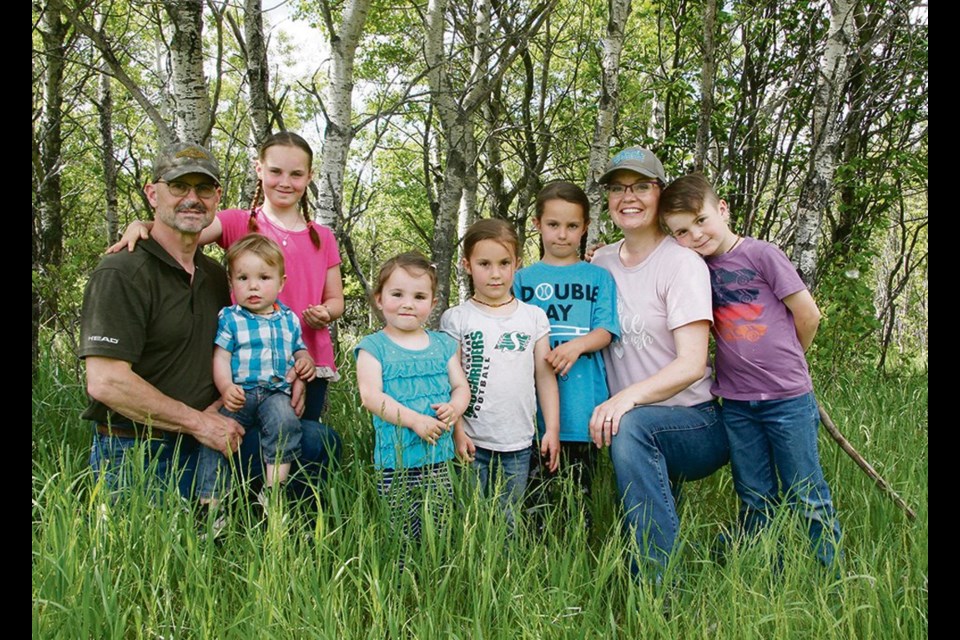BALGONIE, Sask. — In the gently rolling land not far northeast of Regina there are trees. Lots of trees, if one considers the lack of them on the nearby plains.
On the Cayer farm, they call those trees the forest. And in the forest, there are pigs and cattle. Berkshires and Low Lines, to be exact.
Andre and Lauren Cayer and their six children live here on 7Cs Farms, a name they are carrying on from the honey farm Andre’s parents established on the same land in the 1970s.
The couple moved back to the farm just a few years ago after careers in the armed forces.
Andre spent 30 years in the army as a medic, including stints in the former Yugoslavia and Germany, and in the recruiting office in Saskatoon before retiring.
Lauren, who grew up near Macdowall, where trees are truly plentiful, joined the navy in high school and spent 19 years in administration. She was a logistics operator and a member of the Canadian military national volleyball team, which took her to competitions in Brazil, Cuba, India and the Netherlands. In 2010, she was the inaugural reserve sailor of the year.
“I never thought I would be a pig farmer in Saskatchewan,” she said.
But it turns out a small farm in Saskatchewan is a good place to raise kids and livestock, as well as expand an additional business that Andre had established in 2005 while still in Saskatoon. The army had offered some education money for those contemplating life after the armed forces.
“I got the idea in January 2005 and by June 2005 I was incorporated,” Andre said.
Watercycles Energy Recovery Inc. is a drain wastewater-to-water heat exchanger that takes the heat from hot water going down the drain during a shower and pre-heats the cold water entering the hot water tank to save energy and money.
The product has been a finalist for numerous business awards in both Saskatoon and Regina, and was named the 2007 best new product in the province through the ABEX awards. More recently, Watercycles has been a finalist for its export business.
The heat recovery units are made on the farm now, by a staff of eight to 10 people, and are shipped across Canada. In Manitoba and Ontario, the exchangers are mandatory in new construction and Cayer’s business is mainly in those provinces, even with the transportation to market.
“We compete very well against the largest wholesaler in the country,” Andre said.
But now the entrepreneur has set sights on the short line agricultural equipment market. It’s not that surprising, considering that his grandmother was a Doepker from Annaheim.
He planned to exhibit some of the company’s new items, which include a hammermill, compact manure spreader for smaller operations, and a box scraper also designed for smaller acreages, at Canada’s Farm Show this week in Regina.
“This is our first step into anything farming related,” he said. “I think agriculture has some legs.”
Cayer said not everyone has gone to bigger land bases and equipment. The family’s own farm is an example, and the company’s engineer, Brendan Rieger, has just purchased a quarter-section, a handful of cow-calf pairs and some meat chickens.
They say there are a lot of people like them out there who will never be large farmers but still want to have a foot in agriculture.
Take the compact manure spreader, for example. Rieger said it’s ground driven and can be pulled by an ATV.
“It’s not new,” adds Cayer. “We just want to make it here.”
Other employees also come from similar small operations where the philosophy is just a bit different.
At 7Cs, the Cayers used the wooden shipping boxes from steel and copper to build feed storage for their animals.
The pigs and cattle run behind electric and wood fence and in addition to grazing are fed screenings from local processors. A high school student has been hired to do chores; the Cayer children are still a bit too young for that. Anika is nine, Lochlan eight, Katriona six, Veronica, five, Sophia, three, and baby Andre is not yet two.
Anika is already helping in the business office, however.
The children are home schooled and can see exactly how entrepreneurship and agriculture can co-exist.
“I just always wanted to have my kids around,” Lauren said of the decision to keep them at home. They do participate in sports activities and take piano lessons from their grandma who lives next door and has taught piano lessons for years.
Typically, Lauren would have a large garden in a forest clearing a couple hundred metres from the house but this year it’s too wet in that spot. They have also readied a spot for a large greenhouse, complete with a natural gas hookup.
It’s next to the area where the pigs and cattle roam among the trees.
“We believe your animals should have a life,” said Andre. “These pigs were born in the forest, where they have real ground to root in. We don’t clip their teeth. They don’t need iron supplements.”
Asked why they chose Berkshires when they decided to get pigs in 2019, Lauren said: “Because they’re delicious!”
They sell the dark, marbled flavourful meat generally in quarters and halves. They’ve learned some early lessons, such as not keeping all the offspring from 10 sows.
“We had over 100 that year,” Andre winced.
Sales happen mostly by word-of-mouth and processing occurs wherever they can find space.
They have considered processing on the farm, but Andre said that side of the business “isn’t really my thing.”
That said, it could happen because there are always ideas about what to do on the farm. Last year, they had laying hens in chicken tractors.
The Cayers see their acres as endless potential, even if they aren’t large. Neighbours have sheep, goats, cattle and dairy operations.
“I honestly think it can be done,” said Andre of small farm survival in Saskatchewan.




